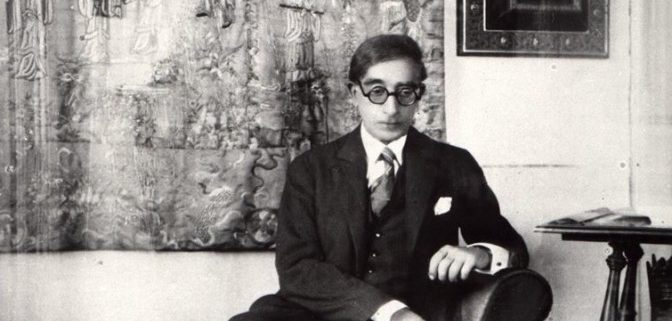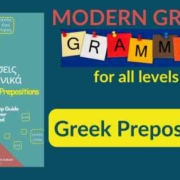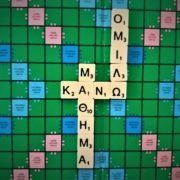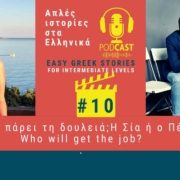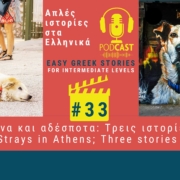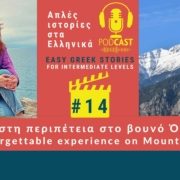Constantine P. Cavafy is a distinguished Greek poet and was also one of the most original and influential Greek poets of the 20th century, who, though, remained virtually unrecognized in Greece until late in his career. Nowadays, his poetry is widely celebrated and taught in school in Greece and Cyprus, as well as in universities around the world.
The life of Constantine Cavafy
Constantine Cavafy was born in Alexandria, Egypt, on April 29, 1863. His father died when he was seven, leaving the family poor. Shortly after this, the family moved to England, where Cavafy stayed until he was sixteen and became fluent in English. [He also picked up French and Italian during his life.] His two oldest brothers were supposed to take over their father’s business but they were young and inexperienced. Combined with the Long Depression of 1873, financial problems forced the family to move back to Alexandria in 1876, where they lived in great poverty.
In 1882, disturbances in Alexandria caused them to move again, though temporarily, to Constantinople. Even though their lives were full of hardship, Cavafy was inspired to write his first poems during this period.
In 1885, the poet returned to Alexandria where he worked as a journalist and civil servant for more than thirty years. This job wasn’t of much interest to him, but it allowed it ample time to write poems and prose essays. The poet had a very small social circle and continued to live in Alexandria until his death from cancer of the larynx.
The Poet’s work
When Cavafy died on 29 April 1933, his 70th birthday, his work was little known. This is probably because he refused to formally publish his work as well as because his style was so distinctively different to the other poets of his time. Instead, he preferred to print it out himself and share it with anyone interested. The publication of the first substantial collection of his poems came after his death, in 1935, when he started becoming more well-known and gaining appraisal from critics.
Cavafy wrote 155 poems, while dozens more remained incomplete or in sketch form. His work draws on his extensive knowledge about the Hellenistic era, which is why he describes himself as a “poet-historian”. Many of his poems are pseudo-historical, or seemingly historical. Some of the defining themes of his poetry is uncertainty about the future, sensual pleasures, the moral character and psychology of individuals, homosexuality, and nostalgia.
A poem of his that most Greeks are familiar with, is “Ithaca” which was written in 1911. It was inspired by Odysseus’ journey back to his home island after the Trojan War, as depicted in Homer’s Odyssey. The poem focuses on the idea of a destination that produces the journey of life: “Keep Ithaka always in your mind. / Arriving there is what you’re destined for”. It also advises the reader-traveler, to be full of hope but to not feel disappointment if at the end of the journey they realize that Ithaca has not much to offer them, since Ithaca gave them the chance to embark on a wonderful journey.
If you want to listen to the original poem in Greek, then click here, and go to our Greek article
If you want to listen to the English translation, then click here; Sean Connery reads ITHAKA | Powerful Life Poem by C.P.Cavafy
The poem “Ithaca” by CF Cavafy – English Translation
(This poem is also translated into many other languages, so if you search on the internet, you will most likely also find a translation in your mother tongue.)
As you set out for Ithaka
hope the voyage is a long one,
full of adventure, full of discovery.
Laistrygonians and Cyclops,
angry Poseidon- don’t be afraid of them:
you’ll never find things like that on your way
as long as you keep your thoughts raised high,
as long as a rare excitement
stirs your spirit and your body.
Laistrygonians and Cyclops,
wild Poseidon- you won’t encounter them
unless you bring them along inside your soul,
unless your soul sets them up in front of you.
May there be many a summer morning when,
with what pleasure, what joy,
you come into harbors seen for the first time;
may you stop at Phoenician trading stations
to buy fine things,
mother of pearl and coral, amber and ebony,
the sensual perfume of every kind-
as many sensual perfumes as you can;
and may you visit many Egyptian cities
to gather stores of knowledge from their scholars.
Keep Ithaka always in your mind.
Arriving there is what you are destined for.
But do not hurry the journey at all.
Better if it lasts for years,
so you are old by the time you reach the island,
wealthy with all you have gained on the way,
not expecting Ithaka to make you rich.
Ithaka gave you the marvelous journey.
Without her, you would not have set out.
She has nothing left to give you now.
And if you find her poor, Ithaka won’t have fooled you.
Wise as you will have become, so full of experience,
you will have understood by then what these Ithakas mean.
(Translated by Edmund Keeley/ Phillip Sherrard)
+++++++++++++++++++++++++++
Let’s read one more poem of Cavafy.
(For the Greek text, please click here for the Greek article)
This poem “One Night”, was started in 1907 and completed in 1916:
The poem “One Night” by CF Cavafy – English translation
The room was cheap and sordid,
hidden above the suspect taverna.
From the window you could see the alley,
dirty and narrow. From below
came the voices of workmen
playing cards, enjoying themselves.
And there on that ordinary, plain bed
I had love’s body, knew those intoxicating lips,
red and sensual,
red lips so intoxicating
that now as I write, after so many years,
in my lonely house, I’m drunk with passion again.
(translated by Keeley and Sherrard).
What strikes us as a bit odd is the vast gap between the start and completion dates for this poem. It seems that Cavafy used to write down a few lines on a sheet of paper, then place it in an envelope. He stored all these envelopes until the moment when he felt capable to finish the poem in a way that satisfied him. As you can see, his poems were a result of rewriting and rethinking.
+++++++++++++++++++++++++++
PS. Do you want to immerse yourself in the Greek language and grow your reading and listening skills?
Then the “Ultimate Listening Comprehension eBook” might be what you are looking for.
This eBook contains 12 texts, all related to Greece and Greek culture. On top of that, the Audio-mp3 files are included,
so you can listen to a native Greek speaker while improving your listening skills in Greek.
The eBook is perfect to improve your reading and listening skills, especially if you are an intermediate-advanced student.
+++++++++++++++++++++++++++
Reading poetry, or translating it, is not the easiest thing to do in another language, but it is definitely worth giving it a try.
Good to Know!
An Omilo student from Sweden, Bjorn Thegeby, started at the “beginner 2 level” at Omilo some years ago, and is improving his Greek every year since (by himself, as well as with Omilo during the summer season)
We are very proud to announce that Bjorn also started his own website with translations of Greek Poetry. Congratulations Bjorn – μπράβο σου!
Click here to see his website, and read more poems of various Greek poets, in Greek and translated into English by Bjorn

